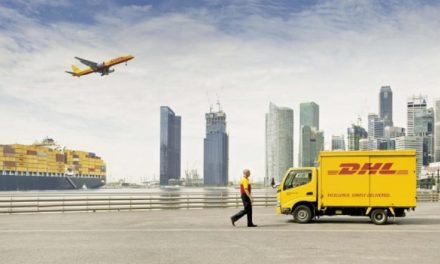
Deutsche Post DHL release study of future trends
Deutsche Post DHL has just published a new study, “Delivering Tomorrow – Customer Needs in 2020 and Beyond.” Deutsche Post DHL has just published a new study, “Delivering Tomorrow – Customer Needs in 2020 and Beyond.”
The research provides a number of expert opinions and analyses garnered from 900 international respondents, including CEOs from leading MNCs and respected scholars, on issues such as globalisation, economy, technology, logistics, environment and society.
The study reveals trends in these areas up to the year 2020 and beyond, and serves as a guiding principle for future business strategies.
A DHL statement reads:
Highlights of the report include a ‘green’ product revolution; a broad, technology-driven transformation in customer habits and expectations; and the emergence of China an economic and technological leader. The study exposed some interesting regional differences, with Asian respondents identifying trends in contrast to those promoted by their Western peers. Many respondents, regardless of origin, endorsed hypotheses of particular interest for companies and individuals in Asia.
By carrying out this study, the mail and logistics group has created an orientation guide for possible future scenarios. Deutsche Post DHL has made use of the knowledge gained by integrating it into its recently presented corporate strategy. “The study’s results show that issues such as sustainability, education and social responsibility will gain in importance for companies in the future. By implementing programs like GoGreen and Teach First today, we are already preparing ourselves for the challenges of the future and pointing the way ahead by highlighting key issues early on,” said Frank Appel, CEO of Deutsche Post DHL, at the official presentation of the study at the Globe Forum in Stockholm.
The research and analyses for the study “Delivering Tomorrow – Customer Needs in 2020 and Beyond” were carried out between June 2008 and January 2009. 81 future theses were developed and then discussed at length by the participants. 900 people from all corners of the globe, including CEOs from prestigious international companies and scholars from the fields of economics, futurology, and logistics as well as experts provided by selected customers from a wide range of sectors received the comprehensive questionnaire for evaluation. The study utilized Delphi methodology, which has been in use since the early 1950s. It consists of a multistage assessment process, during which experts are presented with various theses and asked to provide their opinions. This systematic approach helps ensure Delphi studies produce prognoses that are generally more precise and coherent than those derived from general surveys. Key predictions arising from this study concentrate on the challenges of climate change, the influence of increasing Internet networking, and the growing importance of the logistics industry.
Climate change and CO2 reduction
Climate change is already widely perceived as one of the greatest challenges facing humankind. The study participants predict that, in the years to come, purchasing decisions will no longer be based solely on brand, quality and price. In the future, the environmental impact of products and services will play a major role. “If you look at the label on a glass of jam today, you’ll see it lists the number of calories. But in 2020, likely labels will also indicate how much carbon dioxide was emitted in production and transport of the product,” comments Frank Appel. To a certain extent, consumers will be willing to pay more for ecologically sound products and services. With less environmentally conscious providers striving to overcome their competitive disadvantage as quickly as possible, consumer behaviour will effectively bring about a steady improvement in environmental standards.
A few differences were seen between responses from the East and West. For example, Asian experts are far more inclined to believe in the worldwide emergence of eco-friendly “zero-emissions cities” than their colleagues in Europe, Africa, and America. Asian experts also believe that customers are prepared to accept longer delivery times for their orders in the interests of more climate-friendly logistics.
Logistics companies lead the way
In spite of the current financial crisis, the Delphi experts do not foresee far-reaching upheavals within the existing political and social system – in 2020 the world will still be run as a market economy. The competition for growth, wealth, and resources will persist, with countries and companies the major players. The trend toward outsourcing production will continue, and many companies will look to global value chains in the pursuit of a competitive edge. On the other hand, the Delphi study also predicts that companies will have to collaborate more often and more closely than ever before. At the vanguard of change, the logistics industry will be the model that other sectors follow. To combat the high cost of energy, logistics companies will invest more resources than ever before into establishing and operating shared networks. Appel explains: “Ensuring that the logistics of the future is as environmentally friendly as possible is one of our strategic goals. We already offer carbon-neutral shipping, for example. And we were also the first logistics company to create a climate protection program that ties us to specific emission reduction targets. We’re already on the right track. But as the Delphi study shows, by 2020 a good number of our competitors will have copied us. So we have to keep on finding new ways to keep ahead.”
Business via the Internet – anytime, anyplace
Customers in 2020 may attach great value to the environment, but not at the expense of speedy delivery. They will want all products and services to be available immediately. Consequently, consumers will demand greater transparency and extensive information in real time from suppliers. This will make the Internet more important than ever: by 2020, a good deal of the population of the world, primarily in developed and emerging counties, will be almost permanently online and some three billion people will conduct their business exclusively over the World Wide Web. The pace of events will continue to increase – not just in the commercial world, but rather in all walks of life. The demand for flexibility and permanent availability will increase.
Optimistic outlook
Although terrorist attacks and global pandemics will remain a threat in the future, the experts believe that these scenarios can be kept in check through financial and technological investment. Interestingly, while Asian experts are more pessimistic than their peers when it comes to security and public health, they tend to have strong confidence in technology’s ability to transform business practices and play an increasingly innovative role in the commercial world.
A similar trend applies to the growing global population. The respondents from Asia are confident that state-organized population control will be an effective tool for arresting population growth, and most of them predict that the world population could stabilize between seven and eight billion. By contrast, respondents from other parts of the world are convinced that the population will continue to rise, and with it the consumption of resources. “Nevertheless, our experts were generally optimistic,” says Frank Appel, “They believe that these future challenges can be controlled by market economics.”












